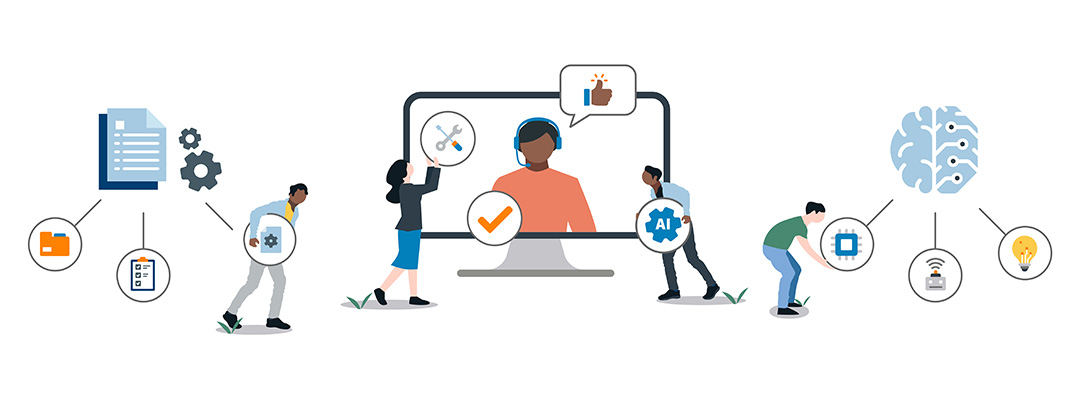We have mentioned before that implementing structured knowledge management paired with AI algorithms can be a big support for modern customer service. Today we will have a closer look at both of these topics and ask ourselves, what exactly their role in the bigger picture is.
What is knowledge?
This question might seem philosophical, but within the context of business and knowledge management it is an appropriate one. Because over the years, each and every company accumulates enormous amounts of knowledge. This includes, among other things:
- Glossary and factual knowledge such as the company’s founding year, office locations, number of employees, departments, revenue, and so forth.
- Process knowledge, i.e. how various internal and external processes are handled (ideally as efficiently as possible); what are the guidelines for incident management? Which mandatory meetings are held in what frequency? What are the standards for our financial reporting?
- Archival knowledge, including processes that might not be of any immediate importance, but might have informational value in the future, e.g. reports from past incidents, repeatedly occurring service tickets, or registers of release notes for your products.
- Unstructured knowledge - such as emails or handwritten notes - which is created all the time without a good way to retain and store it. This is particularly lamentable, since a lot of essential processes and facts gets lost without there even being an awareness of its existence.
This list is by no means exhaustive and indeed there are few things in your company – externally or internally – that can not in some way be declared “knowledge” or are somehow involved in the generation of knowledge.
The problem with company knowledge
Now we have all of this knowledge that should be documented, tracked, and ideally leveraged, but more often than not companies lack the processes and structures to optimally conserve this knowledge and make it usable for all employees. Data and documents are often stored and hidden on different servers, at different locations, behind various accounts, and partly on local hard drives. The insights on which pieces of information could be found where is often locked in the heads of a small number of people responsible. This rather selective approach to company knowledge as well as a lack of transparency on an organizational level negatively impact efficiency. Significant amounts of time and effort go into locating specific knowledge or – in the worst case that it cannot be located – recreating it from scratch. How can problems like these be avoided?

If your company knowledge is spread far and wide, work and progress are slowed down significantly
Tailored knowledge management solutions
Today there exist specialized software solutions for knowledge management. These solutions enable you to consolidate company knowledge, structure it, and offer it on one centralized platform. Ideally, companies can use them to provide all these aforementioned files, documents, and spreadsheets from one single source of truth. Furthermore, knowledge management software often provides advanced functionalities like tagging different kinds of knowledge, categorizing them, and the capability to distribute them based on different user roles and groups. With the right setup, all employees, each team, and each department have access to exactly the knowledge they require and are authorized to see. At any time, it is clear what can be found where and who is responsible and accountable for the currently filed pieces of knowledge.
The benefit for digital customer service
Structured knowledge management can bring benefits and added value for the entire organization, but it is in customer service where its advantages can be demonstrated particularly well. Customer service employees – be it via phone or via chat/email – can use a knowledge database to get faster access to the right information and make it available to customers. At the same time, knowledge management solutions can be used to present customers with preselected information in a self-service portal, basically allowing them to solve their problems on their own. Carefully implemented, proper knowledge management in the long term leads to faster, higher quality customer service.
One additional thing to take note of is the fact that customer service is prone to seasonal peaks as well as significant fluctuations in personnel. Being able to onboard new colleagues quickly and get them up to speed to be productive can be a crucial advantage. This is another area where the advantages of proper knowledge management can be leveraged and can lead to massive time savings in onboarding and, by extension, significant cost savings.
The role of artificial intelligence
All of these functions – be it inside or outside of customer service – can be supported and enhanced by AI algorithms. Knowledge management solutions used in digital customer service can be made more effective by accelerating the functions we have discussed above.
- Semantic analyses of content similarity allow you to avoid creating duplicate content, thereby reducing redundancies, and improving the search engine. Users will get fast access to the right piece of information.
- Responses to tickets and customer queries can be processed quickly and proactively thanks to automated content analyses.
- By recording and archiving correct and incorrect solutions alike, suggesting the right solution to recurring service tickets (or tickets closely resembling each other) can be provided faster over time
As you can see, AI algorithms can support your customer service in the short term, and in the longer term their benefits become even more apparent.
Our own knowledge management solution - Serviceware Knowledge - offers all of the features mentioned above and many more. Companies worldwide use the software in their customer service and process management to amazing effect and we continuously keep building on past successes. New AI-powered functionalities and features are developed and added regularly.

 German
German

